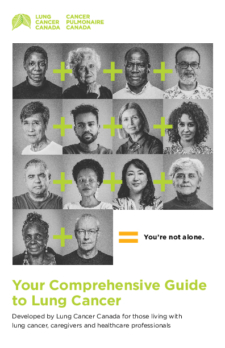Following a diagnosis
- What type of lung cancer do I have?
- Where is the cancer located in my body? Has it spread beyond where it’s started?
- How was my diagnosis confirmed?
- What’s the stage of my cancer? How does that affect the treatment?
- Do I need any more tests before we decide about my treatment?
- Are the tests I need to do covered by my health insurance? How long do they take? Can I do them in a private clinic?
- If I’m concerned about the costs related to my diagnosis and treatment, who can I ask for help?
- Based on this diagnosis, am I a candidate for surgery?
- Has a sample of my tumour been sent for molecular testing? Am I a candidate for targeted therapy?
- Has a sample of my tumour been sent for PD-L1 testing? Am I a candidate for immunotherapy?
- Do I need to see any other doctor or health professionals?
- Is this type of cancer hereditary? Is my family at risk?


